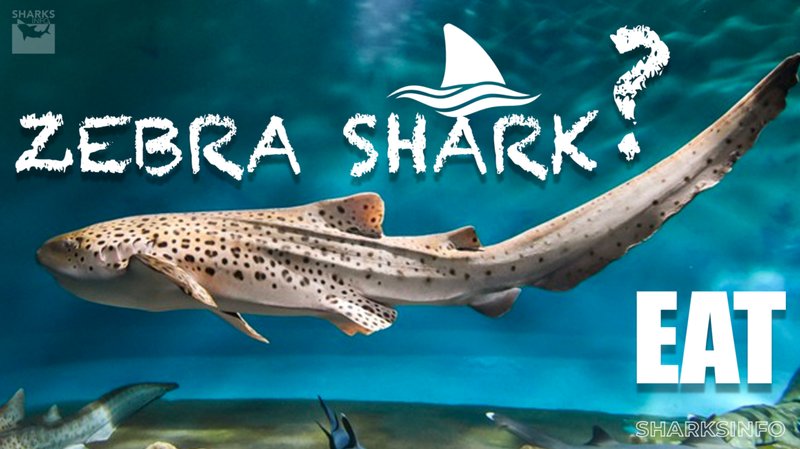
Just like a kid rummaging through the fridge looking for some tasty treats, zebra sharks search for food in their underwater world. They’re more about munching on crustaceans and small fish than chasing down large prey. This shark, also known as the *Stegostoma fasciatum*, gives us a great insight into the role these creatures play in their ecosystems, as well as how their feeding habits affect their overall health and survival.
What Do Zebra Sharks Eat?
Zebra sharks have a pretty varied diet that reflects their surroundings. Typically, they feast on a mix of small fish, mollusks, and crustaceans. Think of them as the ocean’s clean-up crew, helping to maintain balance by eating smaller, less dominant species. Here’s a closer look at their favorite foods:
- Crustaceans: These include crabs, shrimp, and lobsters. The zebra shark uses its keen sense of smell to locate them buried in the sand.
- Mollusks: They particularly enjoy snacking on clams and octopuses. With their rough skin, zebra sharks can also handle the tough shells of these delicacies.
- Small Fish: Whether it’s a bite of sardine or a nibble of goby fish, zebra sharks will exploit any small fish they can find.
Let me explain how they hunt. Instead of lunging after fast-moving prey like some sharks, the zebra shark employs a more laid-back approach. They often rest on the ocean floor and wait patiently, using their excellent camouflage to blend in and catch unsuspecting meals that swim too close.
Feeding Techniques of the Zebra Shark
Here’s the thing: zebra sharks are not your typical hunters. Their feeding techniques are quite unique and fascinating to observe. They don’t just swim around aimlessly; they’ve got a few tricks up their fins.
Zebra sharks often use a method called *benthic feeding*. What does that mean? Picture this: they hover just above the sandy ocean floor, scanning for tasty food. When they spot a crustacean or a mollusk, they go in for the catch. Their flexible mouths allow them to suck in prey like a vacuum cleaner. This suction feeding helps them grab slippery snacks that might otherwise escape.
Additionally, zebra sharks can sometimes be seen gently nudging or flipping over small rocks and corals to uncover hidden delicacies. This behavior showcases their intelligence and adaptability. It’s as if they’re little underwater detectives, thoroughly investigating their environment to ensure their next meal isn’t hiding.
The Role of Zebra Sharks in Ecosystems
Zebra sharks aren’t just minding their own business; they play a crucial role in their ecosystems. By preying on small fish and invertebrates, they help regulate populations of these species. This is vital for maintaining a balanced marine environment. If zebra sharks didn’t feast on these smaller animals, we could see overpopulation, which could lead to a decline in coral reefs and other habitats.
You might wonder, how do they fit into the food chain? Zebra sharks themselves are prey for larger predators, like bigger sharks or large fish. This creates a dynamic balance in the ocean. By contributing to the overall health of their habitat, they also help ensure that their own species continues to thrive.
How Diet Affects Zebra Shark Health
Just like us, what zebra sharks eat can greatly impact their health. A varied and balanced diet allows them to maintain optimal health and energy levels. If they relied too heavily on one type of prey, it could lead to nutritional deficiencies, which can affect their growth and reproduction.
For instance, a zebra shark needs sufficient calcium from crustaceans to support its skeleton and overall vitality. Without a healthy variety of foods, their bodies might struggle to thrive. It’s essential for them to have access to diverse habitats where they can find their favorite foods.
Conversely, in areas where their food supply is dwindling due to overfishing or habitat destruction, zebra sharks can face significant challenges. This can affect their populations and lead to declines in local ecosystems.
Feeding Behavior During Different Life Stages
Zebra sharks undergo several changes as they grow, and their feeding habits change along with them. When they are pups, their diet mostly consists of smaller prey, like tiny shrimp and small fish, which are easier for them to capture. As they mature, they gradually take on larger meals and diversify their diet.
It’s interesting to note that young zebra sharks might be more opportunistic feeders. They may eat whatever they can find since they still have to learn the ropes of hunting. As they become adults, they develop more specialized hunting techniques, becoming more efficient at locating and capturing their preferred foods.
This transition is not just about food size; it also reflects their growth and learning process in adapting to their environment. It’s like watching a child grow up and learn to cook on their own—starting with simple snacks before moving to more complex meals.
Conservation Status and Its Impact on Diet
Sadly, zebra sharks face threats to their populations from overfishing and habitat destruction. As a result, their diets and feeding behaviors may be impacted. If fisheries deplete their prey, zebra sharks struggle to find enough food to survive. This can lead to malnutrition and even decline in population size.
Conservation efforts are crucial to protect zebra sharks and their habitats. By promoting sustainable fishing practices and marine protected areas, we can help ensure that zebra sharks have access to their natural food sources.
So, the next time you think about the diet of the zebra shark, remember that it’s not just about what they eat; it’s about the health of the entire ecosystem they inhabit. Every meal they consume is a piece of the larger puzzle of ocean life.
In conclusion, the zebra shark is a unique species with fascinating feeding habits that are crucial for maintaining marine ecosystems. By consuming a variety of small fish, crustaceans, and mollusks, they play a vital role in their underwater world. Their gentle hunting techniques—like suction feeding and foraging—showcase their adaptability and intelligence.
As we learn more about these creatures, it’s important to consider the challenges they face due to human activity. Supporting conservation efforts can help protect zebra sharks and ensure they continue to thrive in our oceans. Their diet not only affects their health but also impacts the balance of marine life, making it essential for us to pay attention to these gentle giants. By respecting their environment, we can safeguard the future of zebra sharks and the vibrant ecosystems they help sustain.

